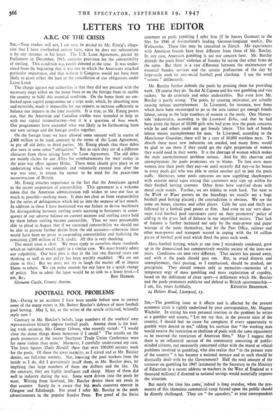LETTERS TO THE EDITOR
A.B.C. OF THE CRISIS
SIR,—Your readers will not, I am sure, be misled by Mr. Einzig's allega- tion that I have overlooked certain facts, since he does not substantiate it by any instance in his letter. The U.S. Loan Agreement, passed by Parliament in December, 1945, contains provision for the convertibility of sterling. This ccndition was keenly debated at the time. It was under- stood from the beginning that it was one to which the Americans attached particular importance, and that without it Congress would not have been likely to grant either the loan or the cancellation of our obligations, under Lease-Lend.
The charge against our authorities is that they did not proceed with the necessary steps either on the home front or on the foreign front to enable the country to fulfil this essent:al condition. On the home front we em- barked upon capital programmes on a large scale, which, by absorbing men and materials, made it impossible for our exports to increase sufficiently to balance our imports in the time available. It is true, as Mr. Einzig points out, that the American and Canadian credits were intended, to help us with our capital reconstruction—but it is a question of how much. Our programmes have exceeded what was likely to be forthcoming from our own savings and the foreign credits together.
On the foreign front we have allowed some amount well in excess of £400 million to be used, contrary to the terms of the Loan Agreement, to pay off old debts to third parties. Mr. Einzig pleads that these debts also were in some sense "obligations." But as such they are of a different character from those arising from the Loan Agreement. The old debts are mainly clams by our Allies for reimbursements for their outlay in the joint war effort against Hitler. These must clearly give place to an undertaking which we solemnly and voluntarily entered into after the war was over, in return for money to be used for the peace-time reconstruction of Britain.
Mr. Einzig attaches importance to the fact that the Americans agreed to the recent suspension of convertibility. This agreement is a welcome token that the American administration still wishes to save, our face as much as possible—nothing more. It does not clear us from responsibility for the series of delinquences which led us into the impasse of last month. In addition to those I have mentioned was our failure to devise machinery for distinguishing between sterling assets accruing to foreigners in conse- quence of our adverse balance on current account and sterling assets held by them before sterling became convertible. Thus we were presumably able to plead in August that if we sustained convertibility we should not be able to prevent further drains from the old accounts—otherwise there would have been no point in suspending convertibility and forfeiting the remaining £100 million of U.S. credit. All this is very shocking.
The moral issue is clear. We must apply to ourselves those standards which an individual would apply in a similar case. We must frankly admit our culpability. Our best plea is that in the last two flurried years our thinking as well as our policy has been terribly muddled. (We are not alone in this.) But we must not try to laugh the matter off or impute blame to others. We can make amends for our lapse by a quick change of policy. Not to admit the lapse would be to sink to a lower level.—I


































 Previous page
Previous page